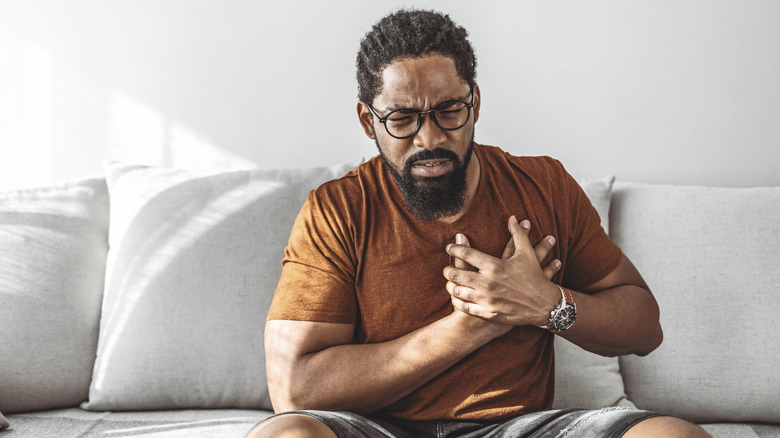What It Means If Your Heart Starts Skipping Beats
Poems and love songs often talk about your heart skipping a beat when you meet "the one," but you might feel your heart also skipping a beat when doing something mundane like shopping for groceries. Maybe it will feel like your heart is suddenly pounding or racing, so you check your Fitbit, Apple Watch, or other healthcare wearable to see if your heart is indeed beating faster. Even if it's a little higher than it usually is while we're standing still, it's probably normal even if it goes as high as 90 beats per minute, according to Harvard Medical School.
"When I hear patients say they feel their heart 'skipping a beat,' it is usually tied to a single premature beat that fails to produce an extra pulse," explains Andrew Zadeh, a cardiologist at Keck Medicine of USC, on the medical center's blog. "The 'skip' is the 'pulseless' time it takes for the next beat or pulse to come in." For the most part, your heart skipping a beat isn't something to worry about, but sometimes, the cause of your heart skipping a beat can signal something more serious.
Common causes of heart palpitations
Keck Medicine of USC says that anxiety or stress can cause your heart to start skipping beats. Unfortunately, noticing your heart palpitations might bring on more anxiety or stress. Practicing stress management techniques such as breathwork or meditation can help calm the stress-induced heartbeat fluctuations. Sometimes, too much caffeine or alcohol might elicit irregular heartbeats. Even nicotine, decongestants, and diet pills could cause your heart to skip a beat.
According to Penn Medicine, sometimes heart palpitations can signal some issues within your body. Low blood sugar, abnormal potassium levels, or anemia could be the cause of your irregular heartbeats. Low blood pressure, low oxygen levels, and medications for high blood pressure can cause these arrhythmias. Because an overactive thyroid can increase your metabolism, it also can have your heart racing while you're remaining still (via Keck Medicine of USC).
Heart palpitations might also indicate something more serious. Older adults are at higher risk of developing atrial fibrillation (also called "afib"), which is "an uncoordinated quivering of the atria that raises the risk for stroke," as noted by Harvard Medical School. Other electrical problems with your heart that can cause arrhythmia are a bundle branch block and an AV block.
When to see a doctor about your heart skipping a beat
That extra shot of espresso in your morning latte might explain your heart skipping a beat, so after several hours, your heart rate should return to normal, says Penn Medicine. If your heart skipping a beat is something you haven't experienced before, take a closer look at your lifestyle, such as whether you're under particular stress or taking a new medication.
It also will help to monitor your heart palpitations. If you feel your heart skipping more than six beats per minute or have several skips in a row, that could be a signal to call a medical professional. Your wearable tracker can sometimes signal if your heart is beating faster than 100 beats per minute, if you're not moving, or have a fever. A heart rate over 100 beats per minute while standing still could indicate something more serious. If your heart palpitations accompany symptoms such as chest pains, problems breathing, loss of consciousness, or dizziness, call 911.



